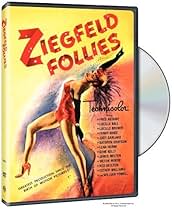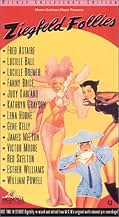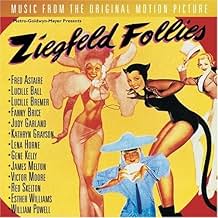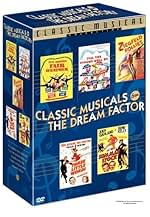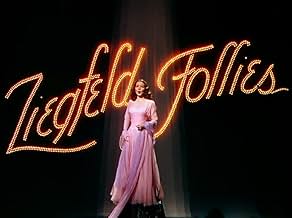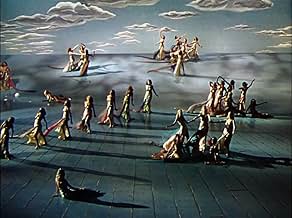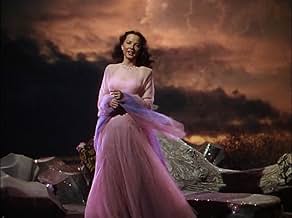CALIFICACIÓN DE IMDb
6.4/10
3.8 k
TU CALIFICACIÓN
El difunto gran empresario Florenz Ziegfeld Jr. mira desde el cielo y ordena una nueva revista a su viejo y gran estilo.El difunto gran empresario Florenz Ziegfeld Jr. mira desde el cielo y ordena una nueva revista a su viejo y gran estilo.El difunto gran empresario Florenz Ziegfeld Jr. mira desde el cielo y ordena una nueva revista a su viejo y gran estilo.
- Premios
- 1 premio ganado y 1 nominación en total
Opiniones destacadas
If you're watching ZIEGFELD FOLLIES expecting a plot of any kind, or even an attempt at one, you'd probably be quite horrifically let down by this film. It's best to approach and accept it for what it is--a crazy filmic patchwork of song and dance and sketches, with some that undoubtedly work better than others, and some that are best left forgotten in the annals of film history. If you *do* bear this in mind, ZIEGFELD FOLLIES is an amusing way to spend a couple of hours as you watch these famous stars, including Fred Astaire, Lucille Ball, Gene Kelly, Judy Garland and many many more trying their utmost best to entertain you. (Admittedly, some with better success than others!)
The film opens with William Powell as Florenz Ziegfeld (reprising his role in THE GREAT ZIEGFELD for what really amounts to a cameo), looking down from heaven as he plans to put up one last, great Ziegfeld follies using the best stars of the day. What immediately follows is the trademark very very pink number, with girls galore floating by on merry-go-round horses, that segues into a rather surreal bit with Lucille Ball (properly attired in a pink fluffy concoction) brandishing a whip (oh dear) against several girls in very sexily-cut black leather body suits. It's an... interesting way to kick the film off, let's leave it at that.
There's no real way to summarise ZIEGFELD FOLLIES except by singling out one's own favourite numbers. And in the forest of boring (Keenan Wynn wastes his talents in a grating and predictable phone sketch), over-the-top (feast your eyes on Esther Williams' water ballet or Kathryn Grayson's operatic warbling as Cyd Charisse dances through bubble mountains) and just plain weird (Judy Garland performing what could well be the first rap in Classic Hollywood--it's not an altogether pretty picture), all of Astaire's contributions to the film stand out.
Astaire is the ostensible star of the film, appearing no less than four times with three gorgeous dance sequences that could certainly count among his personal best. In two of them he's partnered with Lucille Bremer to pleasing effect. "This Heart Of Mine" features Astaire in his rogue persona as he romances Bremer with dance (doesn't he always?) only to steal her jewelry... and for her to steal his heart. The better of their collaborations is the odd but intriguing "Limehouse Blues" with the two of them made up like Chinese (Astaire almost--*almost*--carries it off but ends up looking a little silly). Leaving aside stereotypes, the ballet in Tai Long's fevered dreams is quite stunning, and impeccably staged. I'm still trying to figure out how Astaire and Bremer managed to remember the exact way in which to flip their fans... I hate to think how many times they must have reshot that just to get it all perfectly synchronised!
My favourite number in ZIEGFELD FOLLIES, small surprise, is the one I was looking out for: the penultimate number, "The Babbitt & The Bromide", featuring Astaire and Kelly together on screen, performing the same routine for once in their long illustrious careers. It's a funny little number, with the two fellows they play meeting each other at every stage of their lives, only to have the same inane, mundane conversation. Then follows a small bout of onemanupship as they try to out-dance the other, right into the gates of Heaven. Watching them together is a real treat, because you know these are probably the two best dancer/singer/actors ever committed to film. It's a bit of a shame that their styles don't quite gel: Astaire floats his way through the routine as Kelly pounds the ground as only he can, so their dancing is polished, in perfect time (the timing is absolutely amazing!), but just a little bit off-kilter. It's still the best number in ZIEGFELD FOLLIES though, with Kelly's irrepressible mischief playing against Astaire's ruffled charm.
ZIEGFELD FOLLIES is really just a big, sparkly candy box of a movie--if you bear in mind that a plot was never particularly high on the mind of writers, producers, or directors, and you have a good book by your side to tide you through the (fortunately not too numerous) stretches of boredom, you're set for the evening. Keep the video ready for whenever Astaire breaks onto the screen; that's always a sign of quality. 7/10
The film opens with William Powell as Florenz Ziegfeld (reprising his role in THE GREAT ZIEGFELD for what really amounts to a cameo), looking down from heaven as he plans to put up one last, great Ziegfeld follies using the best stars of the day. What immediately follows is the trademark very very pink number, with girls galore floating by on merry-go-round horses, that segues into a rather surreal bit with Lucille Ball (properly attired in a pink fluffy concoction) brandishing a whip (oh dear) against several girls in very sexily-cut black leather body suits. It's an... interesting way to kick the film off, let's leave it at that.
There's no real way to summarise ZIEGFELD FOLLIES except by singling out one's own favourite numbers. And in the forest of boring (Keenan Wynn wastes his talents in a grating and predictable phone sketch), over-the-top (feast your eyes on Esther Williams' water ballet or Kathryn Grayson's operatic warbling as Cyd Charisse dances through bubble mountains) and just plain weird (Judy Garland performing what could well be the first rap in Classic Hollywood--it's not an altogether pretty picture), all of Astaire's contributions to the film stand out.
Astaire is the ostensible star of the film, appearing no less than four times with three gorgeous dance sequences that could certainly count among his personal best. In two of them he's partnered with Lucille Bremer to pleasing effect. "This Heart Of Mine" features Astaire in his rogue persona as he romances Bremer with dance (doesn't he always?) only to steal her jewelry... and for her to steal his heart. The better of their collaborations is the odd but intriguing "Limehouse Blues" with the two of them made up like Chinese (Astaire almost--*almost*--carries it off but ends up looking a little silly). Leaving aside stereotypes, the ballet in Tai Long's fevered dreams is quite stunning, and impeccably staged. I'm still trying to figure out how Astaire and Bremer managed to remember the exact way in which to flip their fans... I hate to think how many times they must have reshot that just to get it all perfectly synchronised!
My favourite number in ZIEGFELD FOLLIES, small surprise, is the one I was looking out for: the penultimate number, "The Babbitt & The Bromide", featuring Astaire and Kelly together on screen, performing the same routine for once in their long illustrious careers. It's a funny little number, with the two fellows they play meeting each other at every stage of their lives, only to have the same inane, mundane conversation. Then follows a small bout of onemanupship as they try to out-dance the other, right into the gates of Heaven. Watching them together is a real treat, because you know these are probably the two best dancer/singer/actors ever committed to film. It's a bit of a shame that their styles don't quite gel: Astaire floats his way through the routine as Kelly pounds the ground as only he can, so their dancing is polished, in perfect time (the timing is absolutely amazing!), but just a little bit off-kilter. It's still the best number in ZIEGFELD FOLLIES though, with Kelly's irrepressible mischief playing against Astaire's ruffled charm.
ZIEGFELD FOLLIES is really just a big, sparkly candy box of a movie--if you bear in mind that a plot was never particularly high on the mind of writers, producers, or directors, and you have a good book by your side to tide you through the (fortunately not too numerous) stretches of boredom, you're set for the evening. Keep the video ready for whenever Astaire breaks onto the screen; that's always a sign of quality. 7/10
This film is just what it says on the tin, a collection of pieces and sketches similar to those you would have seen in a real Ziegfeld show.
Introduced from Heaven by Ziegfeld himself (William Powell reprising his role of ten years earlier), the acts are rolled out one by one for our appreciation and enjoyment.
High points which spring to mind are Fred Astaire as a jewel thief, charming Lucille Bremer; and as a Chinese n'er do well wishing he could get Bremer the fan she wants. Cyd Charisse and others dancing through bubbles as Kathryn Grayson warbles 'Beauty'. Judy Garland as 'the great lady' mocking Greer Garson. And of course 'The Babbitt and the Bromide' which teams Astaire and Gene Kelly for the first time.
The comedy segments sit less well today and all are too long, however, they're not bad. Keenan Wynn struggles with a dumb telephone operator; Victor Moore has a tightwad lawyer who gets him into jail; Fanny Brice wins the Irish sweepstake; and Red Skelton advertises Guzzler's Gin.
Add Lucille Ball and her cat girls, a touch of La Traviata, and a bevy of lovelies to open and close the show, and you can see why this film was a hit on its first release.
Good for historical interest and the frequent highs, but you might find your attention wandering now and then.
Introduced from Heaven by Ziegfeld himself (William Powell reprising his role of ten years earlier), the acts are rolled out one by one for our appreciation and enjoyment.
High points which spring to mind are Fred Astaire as a jewel thief, charming Lucille Bremer; and as a Chinese n'er do well wishing he could get Bremer the fan she wants. Cyd Charisse and others dancing through bubbles as Kathryn Grayson warbles 'Beauty'. Judy Garland as 'the great lady' mocking Greer Garson. And of course 'The Babbitt and the Bromide' which teams Astaire and Gene Kelly for the first time.
The comedy segments sit less well today and all are too long, however, they're not bad. Keenan Wynn struggles with a dumb telephone operator; Victor Moore has a tightwad lawyer who gets him into jail; Fanny Brice wins the Irish sweepstake; and Red Skelton advertises Guzzler's Gin.
Add Lucille Ball and her cat girls, a touch of La Traviata, and a bevy of lovelies to open and close the show, and you can see why this film was a hit on its first release.
Good for historical interest and the frequent highs, but you might find your attention wandering now and then.
The premise of this film is that Ziegfeld (with William Powell reprising his role) is in heaven thinking of his dream revue, with the rest of the movie just a playing out of that dream revue. I rather wonder about the direction, because this film managed to do what I've never seen done before - make William Powell appear hammy and amateurish in the opening moments as he plays Ziegfeld once again and then disappears for the rest of the film. Believe me, I say this as a huge fan of William Powell.
Thus there is no plot. It involves the big musical and comedy stars of MGM putting on a show of their various capabilities, and for all intents and purposes could be renamed "The Hollywood Revue of 1946" for those familiar with the original from 1929 which basically had the same purpose. Of course, technology has advanced considerably over the ensuing 17 years, but there are still some missteps. Basically, the musical numbers are good, but the comedy skits that punctuate them fall very flat and detract from the entire film. The highlight for me was seeing Fred Astaire and Gene Kelly perform together in a number. The musical numbers make this an above average film, but just barely.
It is most valuable because it shows MGM just as it begins to lose its grip as a leader in the film industry in the post-war era, and also because it reinforces what Buster Keaton always said - that MGM never "got" comedy.
Thus there is no plot. It involves the big musical and comedy stars of MGM putting on a show of their various capabilities, and for all intents and purposes could be renamed "The Hollywood Revue of 1946" for those familiar with the original from 1929 which basically had the same purpose. Of course, technology has advanced considerably over the ensuing 17 years, but there are still some missteps. Basically, the musical numbers are good, but the comedy skits that punctuate them fall very flat and detract from the entire film. The highlight for me was seeing Fred Astaire and Gene Kelly perform together in a number. The musical numbers make this an above average film, but just barely.
It is most valuable because it shows MGM just as it begins to lose its grip as a leader in the film industry in the post-war era, and also because it reinforces what Buster Keaton always said - that MGM never "got" comedy.
If you get easily bored with those old movies that seem to roll and roll forever, this is for you. It really has no plot, but you really don't need one. You could call this movie the Grand Ball, because it really is a set of dances. (Except for a few comedy scenes) Overall, I strongly believe that it is a really good movie, especially in those Fred Astaire numbers (Here's to the Girls, This Heart of Mine, and the Limehouse Blues) This movie is a real MUST for classic movie and Ziegfeld lovers alike.
Ziegfeld Follies is a musical comedy from 1946, from the time when they made lots of musical movies.There really isn't a plot in this movie, but who needs one anyway.As long the musical numbers are working, you really don't need a plot in a movie like this.And then there are also some really funny sketches in the movie.Especially I liked Red Skelton's and Keenan Wynn's acts.They really make you laugh.And then it is great fun to watch Fred Astaire's and Gene Kelly's musical number.This was their only musical act together.Ziegfeld Follies has many great musical numbers.The younger generation doesn't care so much about musical movies, but I'm a teen ager and I like these old musical movies.These kind of movies make me miss those times, and I wasn't even born back then!
¿Sabías que…?
- TriviaThe machine producing the bubbles for the finale was responsible for one of the greatest filming fiascoes in movie history. On the first day of filming the finale, the gas produced by the bubbles caused Vincente Minnelli's cameraman to faint on top of a forty foot lift. While Minnelli struggled to stop his cameraman from falling, the bubbles continued to pour from the machine to such an extent that the soundstage was flooded with bubbles, and no one could get close enough to turn the machine off. Eventually, the fire brigade was called to turn stop it. Afterwards, teams of workers used large rackets to keep them under control, but the gas from the bubbles remained a constant hazard, and between each take Minnelli would order the soundstage's doors open so the cast and crew could breathe. James Melton filmed with a wet handkerchief in his mouth to protect his voice. Fred Astaire and Lucille Bremer's dance was removed completely, since in every take of them, the bubbles obscured part of their face.
- ErroresTowards the end of "This Heart of Mine", as Fred Astaire and Lucille Bremer begin to dance back to the palace, dancers in the background (screen left) struggle to stabilize some of the antler-tree props.
- Citas
Florenz Ziegfeld Jr.: Children play with the dreams of tomorrow. And old men play with the memories of yesterday.
- Créditos curiososZiegfeld Follies credits are in alphabetical order. That is why "Bunin" comes before "Charisse"
- Versiones alternativasThere is an Italian edition of this film on DVD, "FOLLIE DI ZIEGFELD", re-edited in double version (1.33:1 and 1.78:1) with the contribution of film historian Riccardo Cusin This version is also available for streaming on some platforms.
- ConexionesEdited into Hollywood: The Dream Factory (1972)
- Bandas sonorasHere's to the Girls
Music by Roger Edens
Lyrics by Arthur Freed
Sung by Fred Astaire, chorus
Danced by Cyd Charisse, Lucille Ball, chorus
Selecciones populares
Inicia sesión para calificar y agrega a la lista de videos para obtener recomendaciones personalizadas
Everything New on HBO Max in June
Everything New on HBO Max in June
Looking for something different to add to your Watchlist? Take a peek at what movies and TV shows are coming to HBO Max this month.
- How long is Ziegfeld Follies?Con tecnología de Alexa
Detalles
- Fecha de lanzamiento
- País de origen
- Idioma
- También se conoce como
- Ziegfeld Follies of 1944
- Locaciones de filmación
- Productora
- Ver más créditos de la compañía en IMDbPro
Taquilla
- Presupuesto
- USD 3,240,816 (estimado)
- Tiempo de ejecución1 hora 50 minutos
- Color
- Relación de aspecto
- 1.37 : 1
Contribuir a esta página
Sugiere una edición o agrega el contenido que falta

Principales brechas de datos
By what name was Nuevas Follies de Ziegfield (1945) officially released in India in English?
Responda

